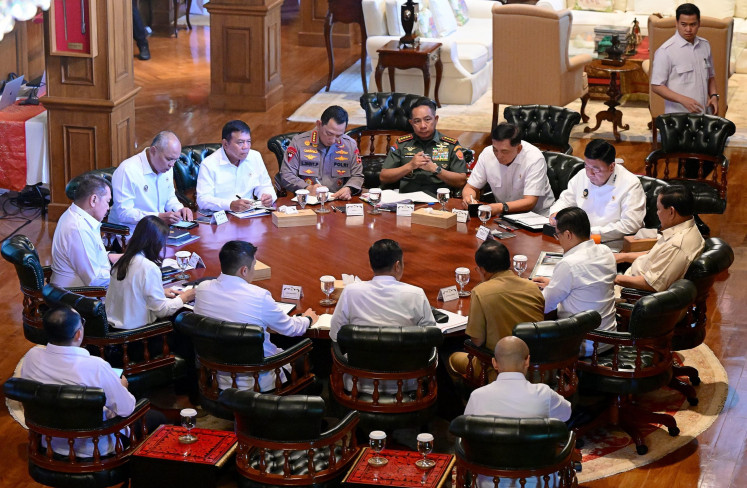Popular Reads
Top Results
Can't find what you're looking for?
View all search resultsPopular Reads
Top Results
Can't find what you're looking for?
View all search resultsIndonesia's clean-energy sector is brimming with potential
Why would anyone want to invest in energy-efficiency measures in Indonesia? The country is known for low energy prices, which have been subsidized for years
Change text size
Gift Premium Articles
to Anyone
W
hy would anyone want to invest in energy-efficiency measures in Indonesia?
The country is known for low energy prices, which have been subsidized for years. It seems hardly anyone is thinking of energy-saving measures, when many top hotels, restaurants and other similar places seem to pride themselves in setting their air-conditioning to the lowest temperature to please their guests and clientele.
Now the country is entering an era in which the new government seems to mean business in rethinking the ways to deal with the country's energy woes.
President Joko 'Jokowi' Widodo seems to be willing and able to make decisions in the sake of the national interest, even if they are unpopular.
Take for example his recent bold decision to cut the long-standing fuel subsidies to create more 'fiscal space' in the 2015 state budget.
Meanwhile, the government has yet to implement necessary incentives and policies to financially support energy-saving measures to bring Indonesia into line with other ASEAN countries.
In countries such as Thailand, the Philippines, Malaysia and Singapore, the government has a range of policies that actively support clean energy including those that strongly encourage energy conservation and efficiency projects.
Now that fuel and electricity subsidies have been significantly lowered, it stands to reason that people will look closer at energy efficiency and conservation measures as well as consider using renewable energy much more seriously.
However, there is a great need for more awareness campaigns to promote the potential of clean energy in terms of the available technology and its money-saving potential.
In this respect, the establishment of a new advocacy group on energy efficiency and conservation, the Indonesian Energy Conservation and Efficiency Society (MASKEEI) is indeed timely.
Amid the public's mixed reaction to the fuel price and electricity tariff increases from Nov. 27 to 28, 2014 MASKEEI held its first national congress to formally establish the organization. The congress was preceded by a national forum discussion on 'Energy Efficiency, Conservation and Resilience for Indonesia's Sustainable Future' in Jakarta.
_______________
Indonesia clearly has great potential to achieve higher energy productivity.
The congress elected RM Soedjono 'Jon' Respati director of the Center for Sustainability at Surya University as MASKEEI's first chairman and CEO of the executive board and Fazil Alfitri, the CEO of Medco Power, as chair of the board of supervisors.
MASKEEI stakeholders are pretty much any energy users and producers who are concerned about the current and future energy security of the country.
It primarily focuses on the demand side of the energy equation and one of its missions is to support all efforts to achieve national energy resilience and sustainability through a central theme in MASKEEI's activities based on 'Enhancing Energy Productivity' in Indonesia.
In accomplishing its mission, MASKEEI is closely collaborating with the government to ensure all measures and policies issued are implemented effectively and consistently directed.
The National Discussion Forum was opened by Energy and Mineral Resources Minister Sudirman Said and followed by international and national speakers from various backgrounds related to energy-saving, the power and transportation sectors as well as policy makers and professionals in related industries.
The forum emphasized that in order to meet the upward trend of the energy needs for national development, the government needed to seriously pay attention to and do something meaningful on the energy-demand side, while continuing efforts to improve efficiency of energy supplies.
The Jokowi administration is planning to build new power plants with a total capacity of 35,000 megawatts (MW) during the next five years. MASKEEI's stance on this government plan is that such huge and strategic projects should, at the same time, consider taking energy-efficiency measures to help meet energy needs by setting up a comprehensive roadmap for the national ECE efforts or energy utilization (demand-side).
The use of energy in Indonesia is clearly wasteful; according to the International Energy Agency (IEA), Indonesia takes 6.191 British thermal units (BTU) of primary energy to produce one dollar of GDP. As such Indonesia's energy intensity or the amount of energy used to produce one unit of economic output is still below the average in Asia-Oceania and is ranked 74th.
Marzan Iskandar, former head of the Agency for Assessment and Application of Technology (BPPT) and chair of the MASKEEI Board of Experts, emphasized that 'for the pursuit of balanced economic growth, Indonesia should optimize its energy efficiency strategy as the production of 1 kWh of electrical energy costs more than the cost of saving 1 KWh.'
Furthermore 'energy efficiency refers to the use of less energy to produce the same number or amount of useful services or the same output. Efficiency is not enough to reduce energy use, but must be accompanied by an increase in energy productivity.'
Indonesia clearly has great potential to achieve higher energy productivity and it looks like the country is currently seeing new momentum in making progress toward achieving national energy security, now that the government seems to be making the right moves in eliminating the huge fuel and electricity subsidies once and for all and finally basing energy prices on their economic merit.
By using smart technology available today, Indonesia can move forward toward securing its energy needs. However, 'energy savings should be supported by appropriate fiscal policies' said Luluk Sumiarso, former director general of new and renewable energy and energy conservation.
MASKEEI believes that beyond broad national carbon-reduction goals, energy management at the national, regional as well as at sectoral levels should have realistic goals that can be defined by clear and consistent metrics, as goals cannot be achieved if they are not measurable.
Local, regional and national government should institutionalize energy usage tracking systems to monitor progress toward their goals. The good news is that all the necessary technologies and methodologies are already here with us today.
MASKEEI has brought together many organizations and people working toward Indonesia's better use of energy.
Many speakers suggest that Indonesia is ready for some great years ahead, though it will require hard work and collaboration in order to get the right government policies and investment climate.
________________
The writer is a MASKEEI executive, research fellow at the Digital Divide Institute, Chulalongkorn University, Bangkok, and associate fellow at the Center for Sustainability, Surya University.










